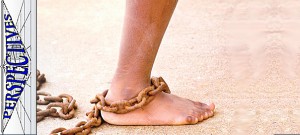
OPINION – Who owns you? Having observed the 150th anniversary of “great emancipator’s” Gettysburg Address earlier this week, it’s a question worth asking.
Many Americans will reflexively answer that the institution of chattel slavery ended following the War Between the States. In that sense, one human being cannot legally own another. But a larger question of self-ownership remains.
“Most people don’t fully grasp the relation between liberty and property. When you own something, you have real power over it. Nobody can use it or take it from you without your consent. You can put your own price on it or refuse to sell it. You are, in a word, free.”
The flip side of this is that if the state owns something, you cannot own it.
If we own ourselves, how is it that the state presumes to claim legitimate power to dictate how we may use our own property—including ourselves? If we consider acts like rape, murder, assault, or theft to be immoral in that they violate a person’s property rights, such acts do not become moral when performed by the state.
For instance, when the state uses the threat of violence to extract money from us to pay for another person’s food, housing, or medical care, it is committing an immoral act. The money taken from us is private property that represents our labor; it’s a tangible portion of our lives.
Walter Williams points out that for government to accomplish this transfer of dollars, “It must forcibly use one American to serve another American. Forcibly using one person to serve another is one way to describe slavery. As such, it violates self-ownership.”
Whatever “good” such money may be directed toward is a highly subjective matter. Whether it is used for education, space exploration, or simply to empower government, at the heart of this action is a system of plunder. It’s a system that, in principle, claims a degree of ownership of our wages, our property and our lives.
Try asking a political candidate, at any level of government, this question: “Is there a point at which the level of taxation becomes so high that the people would be under no moral obligation whatsoever to pay it?” If they cannot provide a specific percentage, then the implication must be that government can legitimately claim 100 percent of what we earn.
How close must we get to that number before we can openly acknowledge what constitutes outright theft and slavery?
The issue of self-ownership and control of one’s property goes far beyond taxation. Seatbelt laws, TSA pat-downs, even code enforcement schemes are also evidence of the stripping away of personal autonomy. It’s not a coincidence that the most totalitarian systems in the history of mankind have always sought to forcefully reduce individual claims to self-ownership.
Another area to watch carefully is how the state regards our stewardship over our children. A Tennessee father was recently arrested while trying to pick his children up from school.
A new school policy required parents to wait in a line up of cars before their children were released from school. With the line stretching nearly a mile long and rather than face an hour-long wait, one man chose to walk his children home. But when he asked that his children be released to him, school officials told him that under their policy he’d have to wait until the all the cars had gone.
When the father persisted he was eventually arrested for disorderly conduct by the school resource officer to underscore that our public servants are, in fact, our masters. At no point did he raise his voice or behave in a disruptive manner. He simply argued that his children should be released to him.
The school says it is backing the officer’s actions and standing behind its policy for what they call safety reasons. They claim that the policy was instituted to prevent children from being taken by strangers.
This amounts to a bureaucratic smokescreen that is being used to obscure the real issue. Whose children are they anyway? In this instance, it appears that the state is claiming a degree of ownership over school children that would trump the natural stewardship of their parents.
If it were your children, would you be willing to accept this as a proper function of government?
Matt Pritchard once wrote that, “Liberty is an idea that must be defined in terms of property and decision-making power.”
It cannot endure in a society that has relinquished self-ownership.
Bryan Hyde is a news commentator and co-host of the Perspectives talk show on Fox News 1450 AM 93.1 FM. The opinions stated in this article are his and not representative of St. George News.
Email: [email protected]
Twitter: @youcancallmebry
Copyright St. George News, SaintGeorgeUtah.com LLC, 2013, all rights reserved.

That would be the last day my kids would attend that school.
Self ownership? In St George? It seems most people are slaves of the church, doing what the church tells them. There is no self-ownership with those who allow a church to control and dictate every aspect of lives.
Oh, brother.
Here we go again…the bitter little man syndrome
Hopefully there will always be a high power than self!